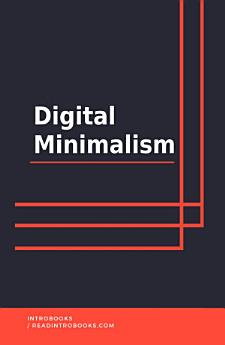Digital Minimalism
এই ইবুকখনৰ বিষয়ে
It is also quite paradoxical that when the maiden iPhone was launched to the inquisitive sight of the larger audience, Steve Jobs was even himself skeptical about the supreme success of the gadget he had brought about.
The spur of technological evolution in itself is not intuitively decent or dreadful. The cause of concern is the basic human adaptability with fast-paced technological growth. Saving an exceptional calamitous incident in the offing, the super-fast journey of technological furtherance will proceed to the infinity.
In the realm of this reality, the modern rationalist human outlook is gradually disappearing from the philosophical scene of technological affinity, that was originally addressed to serve mankind.
This is what the relevant author and computer science faculty at Georgetown University, California viz., Calvin C. Newport speaks about in his much talked about book, Digital Minimalism: Choosing a Focused Life in a Noisy World.







